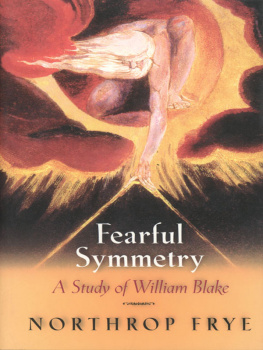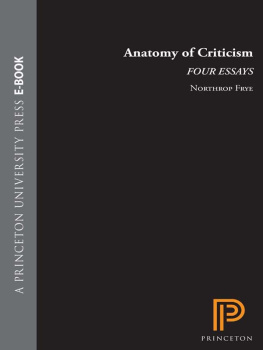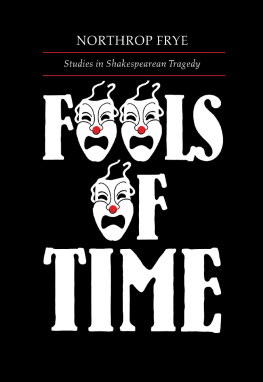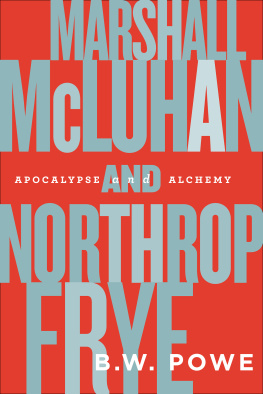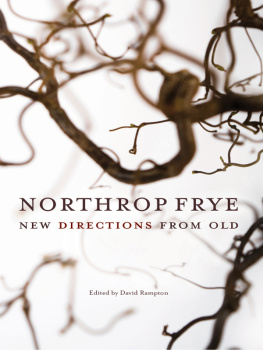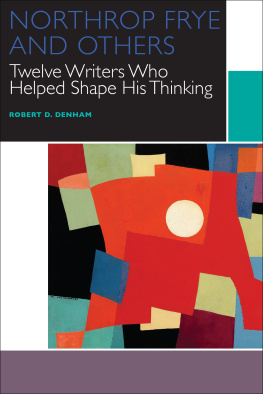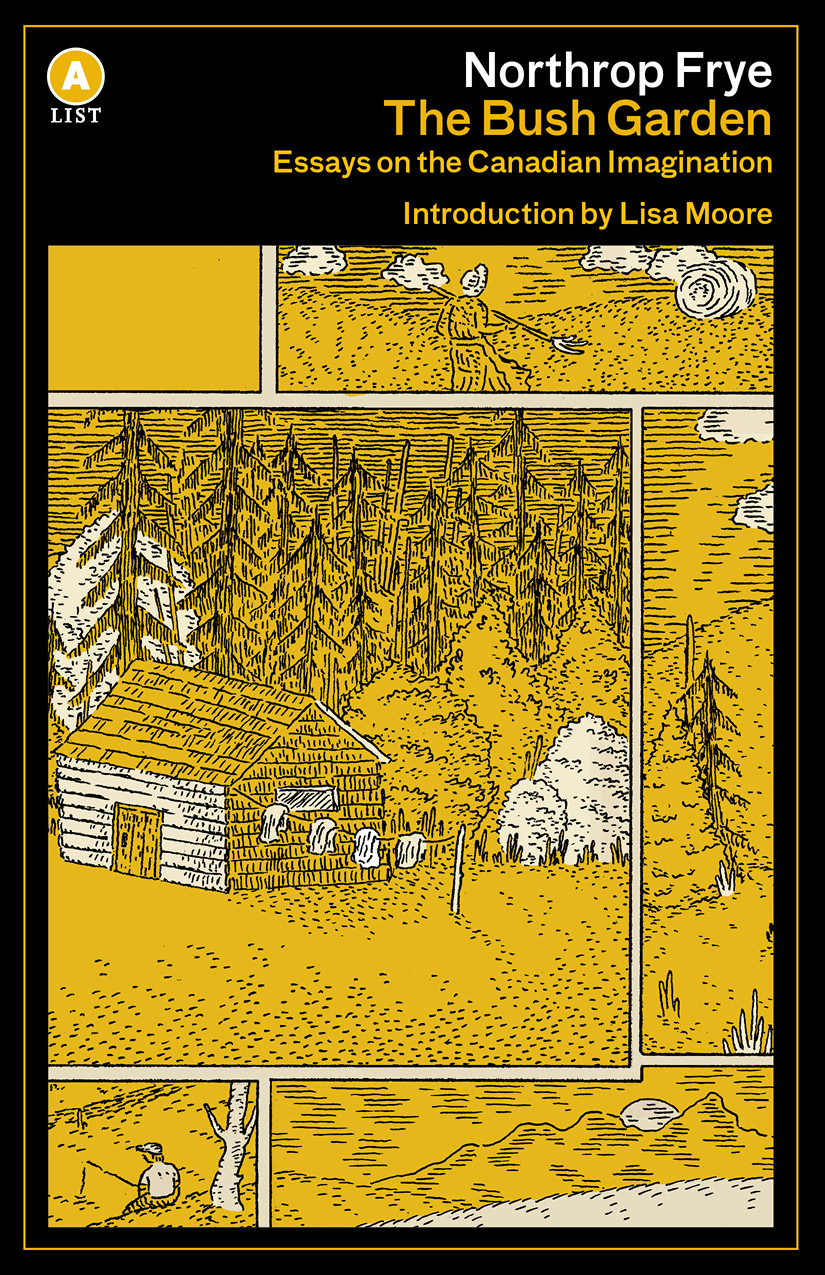THE BUSH GARDEN
Also by Northrop Frye
Fearful Symmetry: A Study of William Blake
Anatomy of Criticism: Four Essays
The Well-Tempered Critic
The Educated Imagination
T. S. Eliot
Fables of Identity
A Natural Perspective: Essays on the Development
of Shakespearean Comedy and Romance
The Return of Eden: Five Essays on Miltons Epics
Fools of Time: Studies in Shakespearean Tragedy
The Modern Century
A Study of English Romanticism
The Stubborn Structure
The Critical Path
The Secular Scripture
Spiritus Mundi
Northrop Frye on Culture and Literature
Creation and Recreation
The Great Code
Divisions on a Ground
The Myth of Deliverance: Reflections on
Shakespeares Problem Comedies
THE BUSH GARDEN
ESSAYS ON THE CANADIAN IMAGINATION
NORTHROP FRYE
INTRODUCTIONS BY LISA MOORE AND LINDA HUTCHEON

Copyright 1971 Northrop Frye
Introduction to A List edition copyright 2017 Lisa Moore
Introduction copyright 1995 Linda Hutcheon
First published in 1971 by House of Anansi Press.
This edition published in Canada in 2017 and the USA in 2017
by House of Anansi Press Inc.
www.houseofanansi.com
All rights reserved. No part of this publication may be reproduced or transmitted in any form or by any means, electronic or mechanical, including photocopying, recording, or any information storage and retrieval system, without permission in writing from the publisher.
Distribution of this electronic edition via the Internet or any other means without the permission of the publisher is illegal. Please do not participate in electronic piracy of copyrighted material; purchase only authorized electronic editions. We appreciate your support of the authors rights.
Library and Archives Canada Cataloguing in Publication
Frye, Northrop, 1912-1991, author
The bush garden : essays on the Canadian imagination / Northrop Frye.
Includes index.
Issued in print and electronic formats.
ISBN 978-1-4870-0266-4 (softcover).ISBN 978-1-4870-0267-1 (EPUB).
ISBN 978-1-4870-0268-8 (Kindle)
1. Canadian literature20th centuryHistory and criticism. 2. Canadian
poetry20th centuryHistory and criticism. 3. Canadian prose literature
20th centuryHistory and criticism. 4. Painting, Canadian20th century.
5. CanadaIntellectual life20th century. 6. CanadaIn literature. 7. Canada
In art. I. Title.
PS8077.F77 2017 C810.9971 C2017-901314-9
C2017-901315-7
Library of Congress Control Number: 2017933807
Series design: Brian Morgan
Cover illustration: Aaron Manczyk

We acknowledge for their financial support of our publishing program the Canada Council for the Arts, the Ontario Arts Council, and the Government of Canada through the Canada Book Fund.
THE SUGAR RUSH OF THE SUBLIME
An Introduction by Lisa Moore
With the title The Bush Garden , Northrop Frye draws on the paradox of a cultivated wild. Throughout this collection of critical essays spanning almost thirty years, Frye points to the small comforts that shield us from the blinding radiance of the Canadian sublime. He speaks about the bedsheets children pull over their heads to protect themselves from gorgons hiding in the shadows, or the veils of mist and rain a painter like David Milne creates in the foreground to obscure the vastness of landscapes and distances that simultaneously recede from us and surround us a vastness that threatens us because its unknowable.
Frye faces the sublime of the Canadian landscape as it manifests through space and time. He shows how a leaf or a branch in the foreground of a Tom Thomson painting only serves to partially obscure the sinister in these works, the not quite emerging or an imaginative instability. This instability, he implies, is Thomson giving up the safety of convention for a leap into the dark. Rivers that twist over distant tracts toward the horizon. Twisted tree stumps, mist and fog. Frye suggests we hold the terror of the unknown at bay long enough to make art of it. And simultaneously he advises gobbling it up like a child with too much cake. Innocence blasted open by the sugar rush.
Frye is most exciting when he confronts the power of nature rendered in Canadian culture. He creates formidable tension between this unmanageable bigness this monstrous landscape, this tangled relationship between the inside and the outside and the will to describe it, all the while knowing it is absurd to try.
I am struck by how informed my experience of the Group of Seven and Tom Thomson has been by Fryes analysis of Canadian painting, even before I had read him. My absorption of Fryes vision has been through the skin; it has bio-accumulated in my brain without my being fully aware of it. That is why, reading Frye for the first time, I was nevertheless able to guess what would happen. I already knew it without knowing it. The wildness we think of as integral to Canadian identity has been given shape, in part, by him. It is a shape we can cast off and with which we can argue. But it is impossible to consider Canadian culture without confronting Fryes brilliant rendering of it.
Western painting, for the last four hundred years or so, has been enchanted by a cheap trick: the illusion of perspective. In his essay Canadian and Colonial Painting, Frye poses a terrifying conundrum: the refusal of the Canadian landscape to be fettered or framed or coaxed into submission by perspective or clich. We cannot hide in a garrison from the out there. The best we can do, Frye suggests, is look; but perhaps we need to squint. I think of photographs from the sixties depicting a crowd of people gazing at an eclipse, wearing those disposable plastic and cardboard sunglasses to avoid being blinded: Frye shows us the measures we can take to hold terror, beauty, and awe at arms length, long enough to gasp a response.
Fryes sentences are taut and languorous at the same time. Snaps of wit. Here is the kind of searing intelligence that allows for bold assertion and self-deprecation. Lassoing phrases: heft, grace, unerring aim, and whack insight in a stranglehold. In fact, throughout these essays there are verbs of strangling, of being devoured, swallowed, and consumed. Frye speaks of a material and imaginative digestion, of the landscape. Entering Canada for the first time is a matter of being silently swallowed by an alien continent. To face the truth of nature, or more colloquially the bush, a combination of unthinkably vast space and deep time, one must sidle forward enveloped in mist or a shadowy blur, or the idea of a region or garrison or condominium a protection from what Frye describes as the unvisualizable. Art-making has the feel of sacrament and sacrifice, necessarily wrapped in hazard tape, all aflame. Attempting to tame nature requires courage because it cant be tamed. The tension between the garden and what is outside is evident in the writing style here. Fryes voice: eloquent paradoxes, mythopoetic resonances, recognizing the ungraspable.


